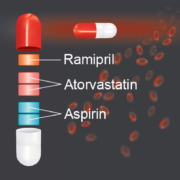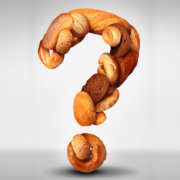Why Do Statins Fight with Grapefruit?
One of the most complicated medication-food interactions is grapefruit and statins, the popular cholesterol-lowering drug. The goal of this Memo is to make sense of the research to date by answering a couple of questions.
Before I begin, let me briefly explain how a statin works. One of the many enzymes required to produce cholesterol in the body is called HMG CoA reductase. In fact, it’s the rate-limiting enzyme; it controls how much cholesterol is made. Interfere with the enzyme, and you can block the production of cholesterol. That’s what most types of statins do; they block HMG CoA reductase, thus limiting the amount of cholesterol made. If your cholesterol is too high, it goes down.
How Does Grapefruit Juice Interact with Statins?
While this is some complicated biochemistry, let’s see if I can explain it simply. There’s a series of naturally occurring enzymes produced in the small intestine called CYP 450 3A4 that modifies the statin before it’s released into the bloodstream; it controls the amount and the form of the statin that gets into your body. Grapefruit juice contains phytonutrients that interfere with the CYP 450 3A4 action, letting more of the statin get into the bloodstream more quickly. Rather than fighting, it was more of a case of helping too much.
Is that good or is it bad? The research never really specifies. The logical expectation is that it would lower cholesterol too much or because it’s not in the correct form, maybe not enough. I couldn’t find an answer to that question. The original research on grapefruit juice began in the late 1980s and seemed to end about 2004. Since then, the recommendation is if you take a statin, no grapefruit juice.
What Is the Real Concern with the Interaction?
This question perplexed me for years, but I finally found an answer: with too much of the statin available due to the interference of the phytonutrients with the CYP 450 3A4, the overabundance could lead to an increased risk of rhabdomyolysis, a breakdown of muscle tissue. Muscle pain is a frequent side effect of taking statins, so the concern makes sense. The problem is that it was never really tested in any research I could find.
On top of that, the primary studies on grapefruit juice and statins used double-strength grapefruit juice in high amounts and a high dose of statins in healthy subjects. Yes, they found that the statin levels increased. But no other measures were checked such as impact on cholesterol production or markers of muscle damage. That was the state of research for the past decade.
What If You Wanted to Boost Your Statin?
In a recently published review paper, researchers theorized on the impact of grapefruit juice on cholesterol levels and the risk of cardiovascular disease. They found that if a statin such as simvastatin was taken at the same time as grapefruit juice, it increased the absorption 260% but if taken 12 hours apart, absorption was up only 90%. With atorvastatin, the increase was 80% no matter when the grapefruit juice was taken.
Calculating the effect on benefits and hazards, when simvastatin or lovastatin are taken at the same time as grapefruit juice, the estimated reduction in LDL cholesterol is 48%, and therefore, the decrease in heart disease is 70%. If the juice is taken 12 hours before these statins, the reductions are, respectively, 43% and 66%. For atorvastatin, the reduction in LDL cholesterol is 42% and in reducing the risk of CVD by 66% (1). Without the grapefruit juice, the reduction in LDL cholesterol is 37% with a decrease in risk of CVD of 61%.
This paper uses published data from many studies to perform these calculations. It doesn’t change the message in their conclusions. The benefits from the additional reduction in cholesterol may be worth the slight risk of rhabdomyolysis, but that doesn’t mean you’ll find any change in the grapefruit juice recommendation any time soon. But at least you now know the issues and why grapefruit is not the demon it’s been made out to be.
The Bottom Line
It’s important to understand that the drug, the statin, is the abnormal thing here, not the fruit. It doesn’t seem to make any sense to modify properties of a healthy diet just to be able to take a medication. But we live in the real world. Until the pharmaceutical industry can find a way to make medications that can help us and work with a healthy diet, be prudent. If you take a statin, talk with your cardiologist about finding a way to fit citrus in your diet. You may have to limit the amount or limit the times of day you eat or drink grapefruit, but as long as the net effect is getting your lipid levels in the desirable range, there has to be a way, especially since most statins should be taken at bedtime. The research is far from clear, so it’s a case by case basis.
What are you prepared to do today?
Dr. Chet
Reference: http://dx.doi.org/10.1016/j.amjmed.2015.07.036.









